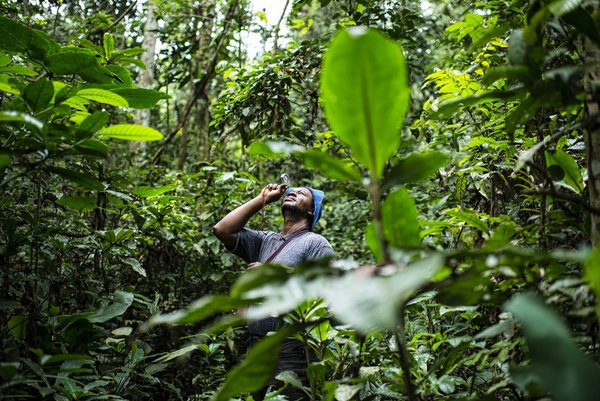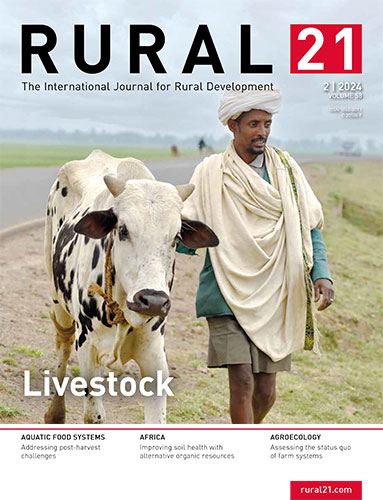 Read this article in French
Read this article in French- Share this article
- Subscribe to our newsletter
The state of central African forests – urgent action needed
The Congo Basin, the world's second-largest tropical forest, plays a critical role in global carbon sequestration. According to the "State of the Forests" report by the Observatory for Central African Forests (OFAC), the Congo Basin sequesters approximately 40 gigatons of carbon annually – roughly equivalent to the annual global CO2 emissions. This impressive figure underscores the importance of this region for both local and global environments. Richard Eba’a Atyi, Regional Coordinator for Central Africa at CIFOR-ICRAF, emphasised the significance of the Congo Basin for global climate and regional water cycles, noting: "This is a global issue. The Congo Basin is a major source of rainfall in the Sahel region. A huge proportion of the world’s ecosystem services come from this region."
An Alarming Forecast
Despite their undeniable importance, the forests of the Congo Basin are under severe threat. Projections suggest that these forests could shrink by 27 per cent by 2050 unless urgent action is taken. The primary driver of this dramatic decline is deforestation, predominantly caused by illegal or unsustainable mining and logging activities. "It is difficult to manage natural resources if we have no information about them. Science is needed to inform those in charge of decision-making, and this requires not only human but also financial resources," explained Eba’a Atyi at the Forum.
Financing is one of the biggest challenges for the conservation and sustainable management of Central Africa's forests. Between 2008 and 2017, the forestry and environment sector in Central Africa accounted for only 11.5 per cent of global financing for the conservation and sustainable management of tropical forests. This inadequate financial support jeopardises efforts to preserve these critical ecosystems.
A lifeline for millions
Central African ecosystems, such as the Congo Basin, provide everything from food and water to wood and medicines. They maintain approximately 40,000 jobs in rural areas and are a vital resource for the sustenance and survival of 75 million people. Dr Aurelie Flore Koumba Pambo from the Congo Basin Forest Partnership (CBFP) highlighted the importance of these forests for local communities and Indigenous Peoples, stressing: "It's not conservation for conservation’s sake, but for the benefit of the local communities and Indigenous Peoples who live there and their livelihoods and well-being. If we have those forests standing there today, it is because people are taking care of them."
According to the experts at the forum, young people and women in particular have a special role to play here. Sr. Lucia Nyamwija, an environmentalist, mentor and trainer for the creation and restoration of food forests in the Virunga landscape in central Africa, emphasised the critical role women play in forest conservation. "The role of women in the protection, conservation and education of forests is crucial," Nyamwija stated. She believes that women's creativity can drive activism and sees women as leaders in families and local villages who “will act locally but impact globally”.
Protected areas as a key to sustainable development
One significant tool in the fight to preserve the forests is the network of protected areas in Central Africa. The "Protected Areas of Central Africa" report by OFAC provides a comprehensive analysis of the region's forest ecosystems, delivering valuable information to decision-makers and managers. OFAC's report highlights that while local community participation in managing these areas is developing, true community-managed protected areas are rare. Over 85 per cent of protected areas are directly managed by governments, with about two-thirds taken care of by independent agencies. Financing remains a central issue. More than 90 per cent of the budget for all protected areas in Central Africa depends on international funding, with the exception of Rwanda’s Akagera National Park.
Discussions at the OFAC Hybrid Forum underscored that saving the forests of Central Africa must be a global priority. The role of the Congo Basin as a carbon sink and climate regulator, its importance for local communities and the threats from human activities and climate change require decisive and coordinated action. "It’s about raising awareness and taking urgent action to protect one of the world’s most valuable resources," concluded Dr Aurelie Flore Koumba Pambo. "The future of the Congo Basin is in our hands."
The global community faces the challenge of mustering the necessary political will and financial resources to preserve Central Africa's forests. Only through collective action can this unique and irreplaceable ecosystem be protected for future generations.
Patricia Summa, Editor Rural 21





Add a comment
Be the First to Comment